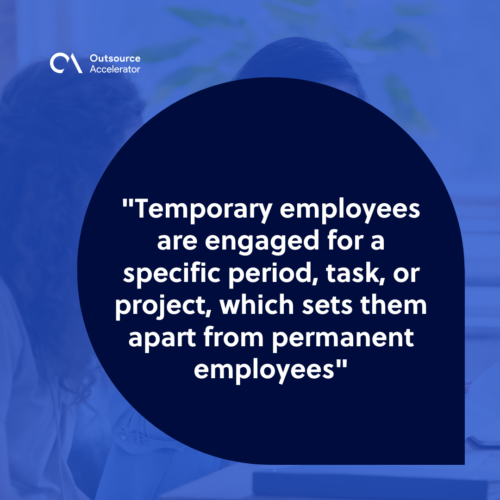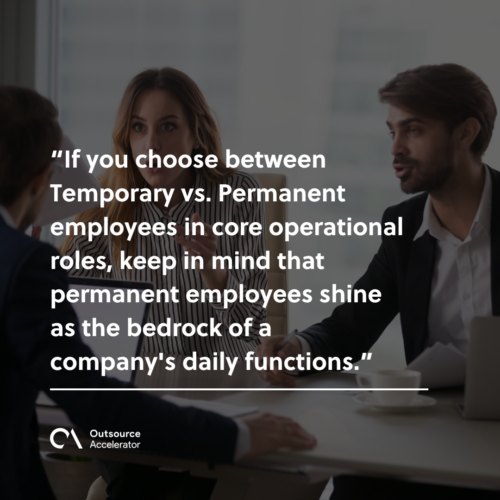Temporary vs. Permanent employees: What does your business need?

In the modern workplace’s ever-evolving landscape, businesses often face critical decisions when structuring their workforce.
One of the key determinants in this regard is the choice between hiring Temporary vs. Permanent employees.
The choice between temporary and permanent employees can determine how effectively a company can scale its workforce to meet varying business demands.
This article will guide you in deciding whether to hire a temporary or permanent employee.
We’ll also delve into the industries where each type excels, examine their limitations, and provide insights to help you make the right choice.
Temporary vs. Permanent employees: Definition of terms
The distinctions between Temporary vs. Permanent employees provide a foundation for understanding how each category contributes to a company’s workforce.
Let’s clearly understand what distinguishes temporary employees from permanent employees.
What is a temporary employee?
A temporary employee is also known as a contingent worker or temp-to-hire employees.
Temporary employees are engaged for a specific period, task, or project, which sets them apart from permanent employees. They are considered a dynamic workforce solution, ideally suited to meet short-term business needs.
However, in some cases, temporary positions serve as a trial period. This is when a worker has the potential to transition into a permanent role if both parties are satisfied with the arrangement.

What is a permanent employee?
In contrast, permanent employees, often called full-time employees, represent a long-term commitment essential for an organization’s day-to-day operations.
Permanent employees enjoy various benefits, such as healthcare, retirement plans, and paid time off. These individuals contribute to the company’s culture, often holding key positions in core operational roles.
Moreover, permanent employees extend to leadership and management positions. Their extensive experience and institutional knowledge are vital for guiding the company’s strategic direction.
Industries where temporary employees shine
Temporary vs. Permanent employees are distinct categories that find their niche in various sectors based on the specific demands of each industry.
Here are some sectors where temporary employees excel:
Seasonal work
In industries characterized by pronounced seasonal fluctuations, temporary employees emerge as invaluable assets.
For example, temporary and permanent employees come into another work contrast in agriculture. In this sector, temporary agricultural workers, often called seasonal farm laborers, ensure crops are harvested at their peak.
However, once the harvest season ends, these temporary employees can be released from their duties—minimizing long-term labor costs while ensuring crops are efficiently gathered.
Project-based roles
Certain industries are inherently project-centric, with workloads reducing with the progression of different projects. Construction and IT consulting exemplify this dynamic.
In construction, temporary employees with specialized skills can be brought on board for a specific project. These skilled craftsmen and laborers contribute their expertise and labor until the project is completed.
Once the project concludes, they can readily transition to the next assignment. This minimizes long-term labor costs for the construction company.
Similarly, in IT consulting companies, temporary employees play an essential role. They frequently require specialized IT skills for various projects, such as system upgrades or software development.
With their proficiency in specific areas, temporary IT consultants can be engaged to provide the necessary expertise for the project’s duration. This ensures the project is executed efficiently and allows the company to adapt to changing technological demands.
Overall, temporary and permanent employees in such industries highlight the value of short-term, specialized talent.
Covering employee leaves
When permanent employees take extended leaves, choosing temporary between permanent employees becomes particularly relevant. Temporary employees are the ideal solution to fill these gaps and ensure business continuity.
For instance, when a key member of the permanent team takes maternity or paternity leave, a temporary employee can perform the essential duties.
The role of the temporary employee in this matter is to maintain workflow and prevent disruptions.
Industries where permanent employees excel
While temporary employees are valuable in certain scenarios, permanent employees are indispensable in industries that require consistency and long-term commitment:
Core operational roles
If you choose between Temporary vs. Permanent employees in core operational roles, keep in mind that permanent employees shine as the bedrock of a company’s daily functions.
Customer service representatives, administrative personnel, and production workers embody the essence of long-term commitment. They are the organization’s heart, providing stability critical for consistent service delivery and product manufacturing.
Unlike temporary employees, who may join short-term to address immediate needs, permanent employees invest in their roles. They also develop a profound sense of ownership and responsibility for their work.
This dedication often translates into a deeper understanding of company values and customer relationships, fostering a strong connection to the brand.

Leadership and management positions
The distinction between Temporary vs. Permanent employees becomes even more pronounced in leadership and management positions. Leadership demands an intricate understanding of a company’s mission, culture, and long-term objectives.
Permanent employees ascend through the ranks, accumulating years of experience and insights unique to the organization.
Moreover, when it comes to charting the course for the future, permanent employees are the compass that ensures the organization stays true to its mission and goals.
Building institutional knowledge
Through their sustained presence, permanent employees actively contribute to accumulating institutional knowledge. Their expertise helps forge innovation, enabling companies to build upon past discoveries and experiences.
A permanent workforce takes the lead for continuity and progress. Permanent employees also ensure that the organization’s intellectual capital continues to grow, fostering innovation and driving long-term growth and success.
Temporary vs. Permanent employees: Limitations
While temporary and permanent employees have strengths, they also come with limitations that businesses must consider when making staffing decisions.
Here are the tables highlighting the limitations of temporary and permanent employees:
| Limitations of temporary employees | |
| Job insecurity can create anxiety and stress, making it difficult for temporary employees to invest in their roles fully. |
| Temporary workers’ long-term attachment to the company’s mission and values may be limited. |
| Limitations of permanent employees | |
| Long-term employees may demand more salary increases over time. This ongoing expenditure can negate the initial cost savings later on. |
| Permanent employees may struggle to adjust to company culture, procedures, or technology shifts. This results in resistance to change. |
Temporary vs. Permanent employees: Making the right choice
Consider the following when choosing between hiring a temporary or a permanent employee:
Financial considerations
When deciding between Temporary vs. Permanent employees, a crucial factor to weigh is your financial considerations. Begin by carefully evaluating and aligning your budget with your long-term financial objectives.
Temporary employees can appear cost-effective in the short term due to reduced benefits and overhead expenses.
However, it’s essential to consider the bigger picture. Over time, the cumulative costs of turnover, recruitment, and training for temporary staff can add up significantly.
In contrast, while initially requiring a greater upfront investment, permanent employees often offer greater stability and reduced long-term recruitment expenses.
Short-term vs. Long-term objectives
Choosing between temporary and permanent employees should align closely with the nature of your projects and business objectives.
If your company frequently engages in short-term projects that demand specialized skills, temporary employees may be the more suitable choice. They provide flexibility, allowing you to scale your workforce up or down as project demands fluctuate.
Permanent employees are often the better option if your business seeks long-term growth and stability.
Legal and regulatory compliance
It’s also crucial to prioritize legal and regulatory compliance. Ensure that your hiring practices adhere to labor laws and regulations specific to your jurisdiction.
Misclassifying employees can have severe consequences, including legal repercussions and financial penalties.
Therefore, it’s imperative to consult legal counsel or human resources experts to ensure that your workforce classification aligns with the law.

Temporary vs. Permanent employees: Which suits your needs?
Choosing between temporary and permanent employees is a critical decision that impacts your business’s productivity, culture, and bottom line.
Both types of employees have strengths and limitations; the ideal workforce composition depends on your specific needs and goals.
By carefully considering your industry and financial situation, you can make an informed decision that aligns with your business objectives.
Furthermore, remember that employee classification is not a one-size-fits-all solution. It should be tailored to your unique circumstances to ensure the success and sustainability of your organization.







 Independent
Independent




